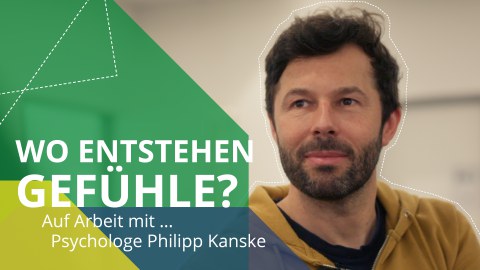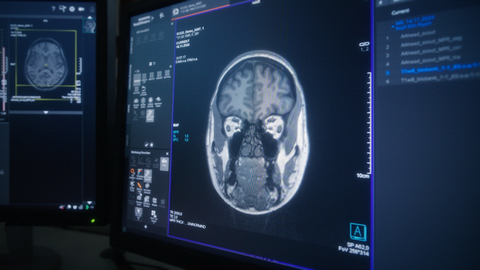Jan 20, 2025
Improving psychotherapy through research: "At work with ..." Neuroscientist Philipp Kanske
What happens in our brain during interaction with other humans? This is one of the central scientific questions that Philipp Kanske, Chair of Clinical Psychology and Behavioral Neuroscience at TU Dresden, is delving into. "The brain is a crazy organ of incredible complexity," the scientist muses, and adds: "How does our brain actually go about managing such complex things as social interaction? And what happens in the brain when this goes wrong?"
To answer these questions, Kanske and his team are examining processes in the brain that are associated with our ability to put ourselves in other peoples’ shoes and empathize with them. "In people with autism, for example, we see that their ability to put themselves in others’ shoes is particularly hindered. Whereas in people who tend to have antisocial personality disorder, their ability to empathize is not as pronounced."
© Tobias Ritz / TU Dresden
The researchers from the Institute of Clinical Psychology and Psychotherapy are currently working on a new experiment to test empathy and the ability to assume other perspectives. Test subjects are shown over 40 video sequences which depict various emotional scenarios while in an MRI scanner. The scanner measures which regions of the brain receive a lot of oxygen-rich blood. From this, the scientists can deduce which regions of the brain are particularly active.
Research to improve psychotherapy
Studies like these help to better understand the mechanisms in our brains - especially when it comes to mental illnesses. In a way, this makes changes in mental disorders more measurable. The data provides the basis for new approaches in psychotherapy. Researchers can use follow-up studies to identify whether theses approaches result in faster and more pronounced improvements and whether they achieve longer-term effects.
"The brain can change a lot more than we thought, even in adulthood," explains Philipp Kanske, and he adds: "If I take some time every day to think about what I'm grateful for that day, this will change my brain."
Behavior in Context: How does the brain control our behavior in certain contexts?
In a new interdisciplinary research project, Kanske and other scientists want to find out how the brain manages to control our behavior in certain contexts. "Our brains are basically making predictions all the time about what's coming next. The reason we understand language so well is because our brains are constantly making predictions about how sentences will continue and preparing our behavior accordingly," explains Kanske.
If the researchers succeed in deciphering the mechanisms of how the brain controls our behavior in highly complex situations such as road traffic, these principles could be transferred to machine learning, for example. The research project entitled Behavior in Context is currently in the competition to become a Cluster of Excellence. "The more precisely we can describe our behavior, the easier it will be to explain phenomena, make predictions and also change them," Philipp Kanske is convinced.
In the video series "At work with...," TU Dresden’s social media team accompanies employees of TU Dresden or its partner institutions for the day. The videos provide insight into the diverse areas of work and responsibilities at TU Dresden. We want to show the people behind everything that makes us special and who do their jobs with passion and dedication! More videos are available on the YouTube channels "TU Dresden entdecken" ("Discover TU Dresden") and "TU Dresden probieren" ("Try TU Dresden")


